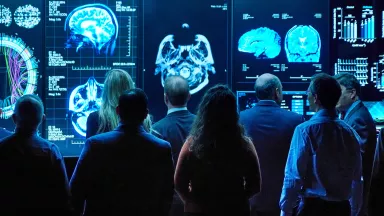What Are Prion Diseases?
Dementia is the loss of cognitive functioning—thinking, remembering and reasoning—to such an extent that it interferes with a person’s daily life and activities. Some people with dementia cannot control their emotions, and their personalities may change. Dementia ranges in severity from the mildest stage, when it is just beginning to affect a person’s functioning, to the most severe stage, when the person must depend completely on others for basic activities of daily living, such as feeding oneself.
Dementia affects millions of people and is more common as people grow older (about one-third of all people age 85 or older may have some form of dementia), but it is not a normal part of aging. Many people live into their 90s and beyond without any signs of dementia.
Prion diseases are transmissible, untreatable and fatal brain diseases of mammals. Their cause is highly unusual: The host’s normal prion protein can, for unknown reasons, malfunction and assemble into structured aggregates called prions that cause infectious brain disease. This process—which can be underway for years before symptoms appear—likely causes the most common form of prion disease in people, sporadic Creutzfeldt-Jakob disease (CJD). Other forms of human prion diseases include variant CJD, fatal familial insomnia, Gerstmann-Straussler-Scheinker syndrome and Kuru.
Types of Prion Diseases
Prion diseases are transmissible, untreatable and fatal brain diseases of mammals. Their cause is highly unusual: The host’s normal prion protein can, for unknown reasons, malfunction and assemble into structured aggregates called prions that cause infectious brain disease. This process—which can be underway for years before symptoms appear—likely causes the most common form of prion disease in people, sporadic Creutzfeldt-Jakob disease (CJD). Other forms of human prion diseases include variant CJD, fatal familial insomnia, Gerstmann-Straussler-Scheinker syndrome and Kuru.
Creutzfeldt-Jakob disease (CJD) is a rare brain disorder characterized by rapidly progressing dementia. Scientists have found that infectious proteins called prions become misshapen and tend to clump together, which causes brain damage. Initial symptoms include impaired memory, judgment and thinking, along with loss of muscle coordination and impaired vision. Some symptoms of CJD can be similar to symptoms of other progressive neurological disorders, such as Alzheimer’s disease.
Other types of prion diseases in humans include:
- Gerstmann-Straussler-Scheinker syndrome
- Fatal familial insomnia
- Kuru
Causes of Prion Diseases
Prion diseases, also known as transmissible spongiform encephalopathies (TSEs), are a family of rare progressive neurodegenerative disorders that affect both humans and animals. They are distinguished by long incubation periods, characteristic spongiform changes associated with neuronal loss, and a failure to induce inflammatory response. Scientists have found that infectious proteins called prions become misshapen and tend to clump together, which causes brain damage and neurodegenerative disease.
The term “prions” refers to abnormal, pathogenic agents that are transmissible and are able to induce abnormal folding of specific normal cellular proteins called prion proteins that are found most abundantly in the brain. The functions of these normal prion proteins are still not completely understood. The abnormal folding of the prion proteins leads to brain damage and the characteristic signs and symptoms of the disease. Prion diseases are usually rapidly progressive and always fatal.
Risk Factors for Prion Diseases
Prion diseases are a rare brain disorder characterized by rapidly progressing dementia. Scientists have found that infectious proteins called prions become misshapen and tend to clump together, which causes brain damage.Risk factors for prion disease include one or more of the following:
- Eating meat infected by “mad cow disease”
- Infection from contaminated corneas or from contaminated medical equipment
- Family history of prion disease
Screening for & Preventing Prion Diseases
Prion diseases are difficult to recognize, as many symptoms are shared among other neurologic pathologies. Typical screening for prion diseases include an MRI, PET or CT scan. Physicians may look for signs and symptoms including presence of certain proteins in the cerebrospinal fluid. However, confirming a diagnosis requires neuropathologic and/or immunodiagnostic testing of brain tissue obtained at biopsy.
Signs & Symptoms of Prion Diseases
Initial symptoms include impaired memory, judgment and thinking, along with loss of muscle coordination and impaired vision. Some symptoms of Creutzfeldt-Jakob disease (CJD) can be similar to symptoms of other progressive neurological disorders, such as Alzheimer’s disease.
Symptoms may include:
- Difficulty speaking
- Confusion
- Fatigue
- Rapidly developing dementia
- Hallucinations
- Difficulty walking
- Muscle stiffness
- Impaired thinking, anxiety or depression
Diagnosing Prion Diseases
Prion diseases are difficult to recognize as many symptoms are shared among other neurologic pathologies. Typical screening for prion diseases include an MRI, PET or CT scan. Physicians may look for signs and symptoms including presence of certain proteins in the cerebrospinal fluid. However, confirming a diagnosis requires neuropathologic and/or immunodiagnostic testing of brain tissue obtained at biopsy.
Treating Prion Diseases
Medical management of prion disease can help slow progress and relieve symptoms. Prion disease cannot be cured, but scientists are working to develop treatments. Using both cell-free and cell-based assays, researchers have tested thousands of compounds and identified hundreds of molecules that inhibit the formation of the abnormal form of prion protein.
Living with Prion Diseases
Prion diseases are rare and incurable brain disorders characterized by rapidly progressing dementia. Scientists have found that infectious proteins called prions become misshapen and tend to clump together, which causes brain damage. Initial symptoms include impaired memory, judgment and thinking, along with loss of muscle coordination and impaired vision. Ultimately fatal, there is no known way to slow the progress of prion disease.




